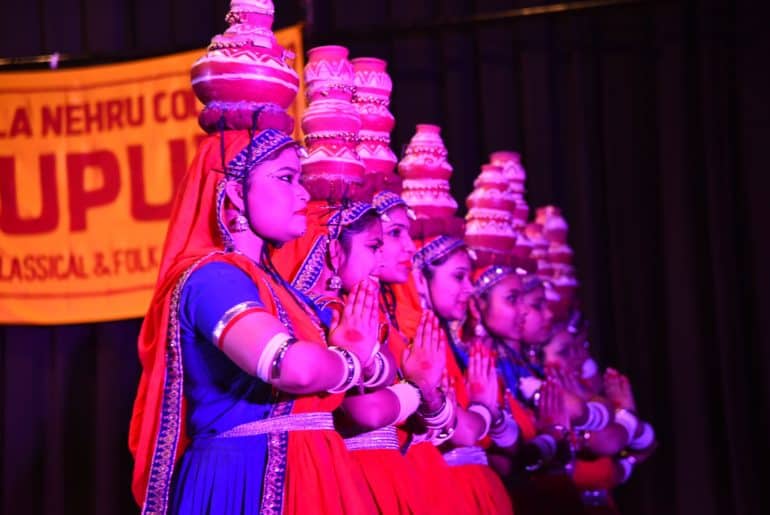On Monday, 29th August 2019, a book discussion with the bestselling writer Ravinder Singh was organised by the English Literary Society of Miranda House.
The English Literary Society of Miranda House celebrated the presence of Ravinder Singh, the bestselling romance writer for their first event of the session 2019-20. The writer talked about his latest book: “The Belated Bachelor Party”, in a book discussion which was attended by a great number of students of Miranda House.
The author, most famous for his book I Too Had a Love Story, began the event by introducing himself and his works. He then went on to narrate the real-life incidents that took place, and which inspired him to write The Belated Bachelor Party. From friends that made little sense, to a Europe trip that went wrong in more ways than one, he kept the audience engaged with his little anecdotes. He revealed that the story is about him and his three other friends who went on a Europe trip for their Bachelor’s Party long after their marriage. By saying this, he also justified the title of the book.
“Since I’ve been writing romance for such a long time, I wanted to challenge myself. So, I decided to write a book that makes people laugh, after writing ones that made them cry,” said the author, explaining why he decided to write this book in the genre of humour.
He went on to talk about friendship and advised the audience to hold on to the friends that they have in life, and also said that the only kinds of relationships that we choose in life are: a lover and friends. He said, “Romance is a subset of the larger set called friendship.”
He further added that the book is about friendship and the special bond you have with people you have chosen yourself to let into your life.
After he finished talking about the books, he took in questions from the audience as well. The audience, eager to participate, asked insightful questions such as- how he dealt with the ups and downs of being a primarily semi-autobiographical writer, and how he integrated social issues in his writing.
On being questioned about the agenda of addressing social issues through his books, he clarified that his book, Your Dreams Are Mine Now, addresses the issue of youth politics and in his another book, Will You Still Love Me talks about road safety.
He further addressed a major issue about the lack of readers in the Indian society. He mentioned that currently there are only a handful of authors in India who work as full-time writers and make a good living out of writing. The problem behind this was, he explained, that the people of our country do not read. Reading is a great task for us and book stores are getting shut. People are going from bad to worse. He made a comparison between India and UK and said that in the UK, people read 10 times more than us.
According to him, “Reading a book is like watching a story getting unfolded in front of your eyes. You live a thousand lives when you read a thousand books.”
The writer further addressed the problems in the publishing market and told the students to focus on their creativity and try the options of self-publishing. He advised the students to try to build up an online audience and then try to approach big publishing houses.
The event was a complete success buzzing with humour, candor, and a lot of life tips.
Feature Image Credits: The Literary Society, Miranda House via Instagram
Priya Chauhan
Satviki Sanjay












 Unlike common perception, winning a quiz competition is more about how much you can analyse and deduce than how much you can memorise. Societies around the university will second to this opinion. Quiz culture in the University is not many years old and has a small but dedicated team of enthusiasts. “It’s a group of like minded people participating in quizzes together and learning together as everyone brings something to the society,” defines Abhaas Mohan, founder of Conquiztador, the Quizzing society of Sri Venkateswara College. As for the auditions, societies have their separate method of evaluation.
“Every person has their own interests, therefore we cannot expect them to be good at everything. we have a written test which has questions from every field. Then based on overall score and sectional score on our personal we take people in, There are also people who join us after the auditions,” says Abhaas.
For Quest- the Quiz society of SGGSCC, it’s all about testing while having fun. “We have fun and interesting questions, where we can entertain them as well as test their aptitude and decide if they are good enough for quizzing or not,” says Utkarsh. As for preparing for a quiz competition, everyone agrees it’s about what you read, the movies you watch and the number of quiz competitions you attend as it gives you a fair idea on the way questions are based and what to expect.
Unlike common perception, winning a quiz competition is more about how much you can analyse and deduce than how much you can memorise. Societies around the university will second to this opinion. Quiz culture in the University is not many years old and has a small but dedicated team of enthusiasts. “It’s a group of like minded people participating in quizzes together and learning together as everyone brings something to the society,” defines Abhaas Mohan, founder of Conquiztador, the Quizzing society of Sri Venkateswara College. As for the auditions, societies have their separate method of evaluation.
“Every person has their own interests, therefore we cannot expect them to be good at everything. we have a written test which has questions from every field. Then based on overall score and sectional score on our personal we take people in, There are also people who join us after the auditions,” says Abhaas.
For Quest- the Quiz society of SGGSCC, it’s all about testing while having fun. “We have fun and interesting questions, where we can entertain them as well as test their aptitude and decide if they are good enough for quizzing or not,” says Utkarsh. As for preparing for a quiz competition, everyone agrees it’s about what you read, the movies you watch and the number of quiz competitions you attend as it gives you a fair idea on the way questions are based and what to expect.

 “I have been into photography, so the next logical step was to be a part of a society where you meet other photographers and get to go to photo walks and learn from professionals,” says Jayati Bhola, a member of the Fine Arts and Photography society of Kirori Mal College.
“I have been into photography, so the next logical step was to be a part of a society where you meet other photographers and get to go to photo walks and learn from professionals,” says Jayati Bhola, a member of the Fine Arts and Photography society of Kirori Mal College.